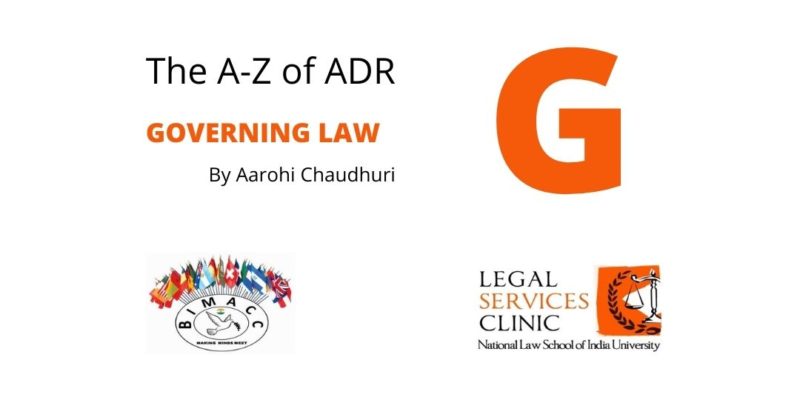
A-Z of ADR: Governing Law
-Aarohi Chaudhuri (II Year, NLSIU Bangalore)
Governing Law in Arbitration
Arbitration, as a private means of dispute settlement, is not tethered to territorial jurisdictions. As a result, the freedom to select the forum for adjudication extends to the freedom to select the legal framework for the same. In other words, parties essentially select not just a judge, but also the law they are judged under. Importantly, this legal framework is not monolithic in nature and comprises of numerous different elements, both substantive and procedural. Parties can select, among other things, the substantive law of the contract, the statutory law governing the arbitration agreement, and the procedural curial law (which is analogous to a civil or criminal procedure statute in litigation). Additionally, arbitration clauses feature a choice of arbitral seat, which is best described as the “center of gravity” or “juridical center” of arbitration- this is because the law of the seat determines important statutory considerations such as challenges to arbitration. A truly international contract between two parties from different home jurisdictions may well select a third law to determine their substantive contractual obligations, a fourth as the law governing the arbitration agreement, and a fifth jurisdiction designated as the arbitral seat. The next section specifically examines how a choice of governing law over the arbitration is arrived at.
Typically, a contract will explicitly designate its substantive governing law, which determines questions of validity, enforcement, breach, and remedies under that contract. This can be in the form of statutes like the Indian Contract Act, bodies of common law like English contract law, or international sales treaties like the Convention on the International Sale of Goods. However, due to the principle of severability, which means that an arbitration clause is read separately from the main contract, the contractual law applicable to the underlying contract does not necessarily govern the arbitration clause. Instead, a set of rules is followed to arrive at the governing law, which determines validity, confidentiality, enforcement, etc. Conventionally, two schools of thought exist regarding the determination of governing law, if not expressly stated in the arbitration agreement. The first believes that the law of the seat must govern the arbitration clause, so as to create consonance between the law used by the Tribunal to determine validity, and the law applied by courts of appeal. The second school holds that the law of the underlying contract must govern the arbitration, as if the parties wished to designate a governing law separate from that of the main contract, they could have chosen to do so. These two approaches are deployed at the end of a 3-stage test laid down by the English courts in Sulamerica.[1] First, the Court looks for an express choice of law. Second, the Court then looks for an implied choice of law. Failing either of these, the Court then moves to the closest connection test, where either of the two previously mentioned schools of thought are followed, in determining whether the law of the seat or the law of the contract has the closest connection to the intended governing law. The next section studies the Indian position on this question.
The English approach to the closest connection test in Sulamerica, and thereafter in Habas Sinai,[2] is to find that the law of the seat should serve as the governing law of the arbitration agreement. The Indian courts, despite recently borrowing the 3-stage test, find the other way, that the law of the contract must govern the arbitration agreement. This position was originally laid down in the NTPC case,[3] which is good law even today. However, conflicting jurisprudence subsequently, as well as procedural inefficiency in Indian courts, have encouraged practitioners to draft clauses that exclude the jurisdiction of Indian courts. As a result, situations such as those of the Arsanovia case,[4] where Indian parties enter into a contract under Indian contract law, select the Indian Arbitration Act as the governing law, but designate London as the seat, granting exclusive supervisory jurisdiction to English courts applying Indian law, have become commonplace. This threw up further confusion in the Enercon case,[5] wherein an almost identical fact matrix, where London was designated as the “venue” and not the “seat” of arbitration. The Indian courts read this to mean that Delhi was the seat of the arbitration, and claimed jurisdiction over the issue. Another significant factor in encouraging parties to move away from Indian courts is the incompatibility of awards made in India, which makes the law of the contract the governing law, to enforcing courts in other jurisdictions like England that favour the law of the seat, for enforcement. However, the recent verdict in Enka v Chubb[6] reverses the position in Sulamerica and is likely to encourage more uniform jurisprudence that favours the selection of the law of the underlying contract as the governing law of the arbitration. If, as under Indian law, parties are obligated to select domestic laws as their substantive law of contract, they can choose to override this presumption by making an express choice of governing law. Therefore, we are well on a course to a more uniform arbitration framework globally.
[1] Sulamerica v. Enesa [(2012) EWCA Civ 638]
[2] Habas Sinai v. VSC [(2013) EWHC 4071]
[3] NTPC v Singer [AIR 1993 SC 998]
[4] Arsanovia v. Cruz City [(2012) EWHC 3702]
[5] Enercon India v. Enercon GMBH [Civ. App. 2086/7 of 2014]
[6] Enka Insaat Ve Sanayi AS v OOO “Insurance Company Chubb” & Ors [2020] EWCA Civ 574
-Aarohi Chaudhuri (II Year, NLSIU Bangalore)
Aarohi Chaudhuri is a second-year student from the National Law School of India University (NLSIU), Bangalore.
BIMACC expresses its gratitude towards the author and to the members of the Legal Services Clinic, National Law School of India University (NLSIU) for their support in our collaborative efforts to promote ADR with this series titled “A-Z of ADR”. The purpose of this series is to increase the understanding of certain fundamental concepts of Alternative Dispute Resolution.
The Legal Services Clinic is a student-run committee that provides free legal services to the socially and the economically backward sections of the society who have difficulty accessing the judicial system. It also has a mandate of spreading legal awareness and providing free legal assistance to those who cannot afford it.
Website: www.legalservicesclinic.org/
Facebook: @legalservicesclinic
Email: lsc.nlsiu@gmail.com
Phone Number: 073586 73214
Disclaimer: The views and opinions expressed in this blog are those of the author and do not necessarily reflect the official policy or position of BIMACC, any of the members of the Board, or the empanelled neutrals. This blog is for informative purpose only and does not constitute legal advice in any manner whatsoever.
